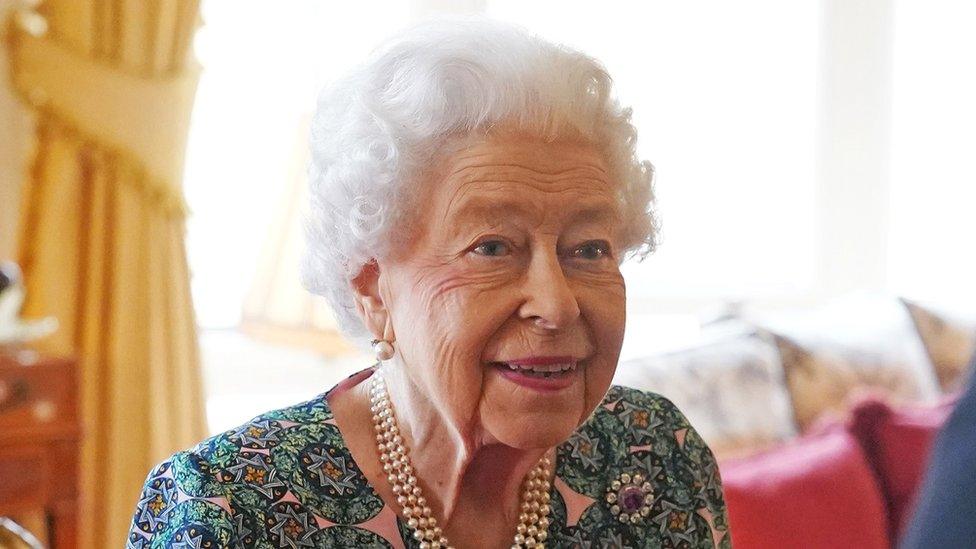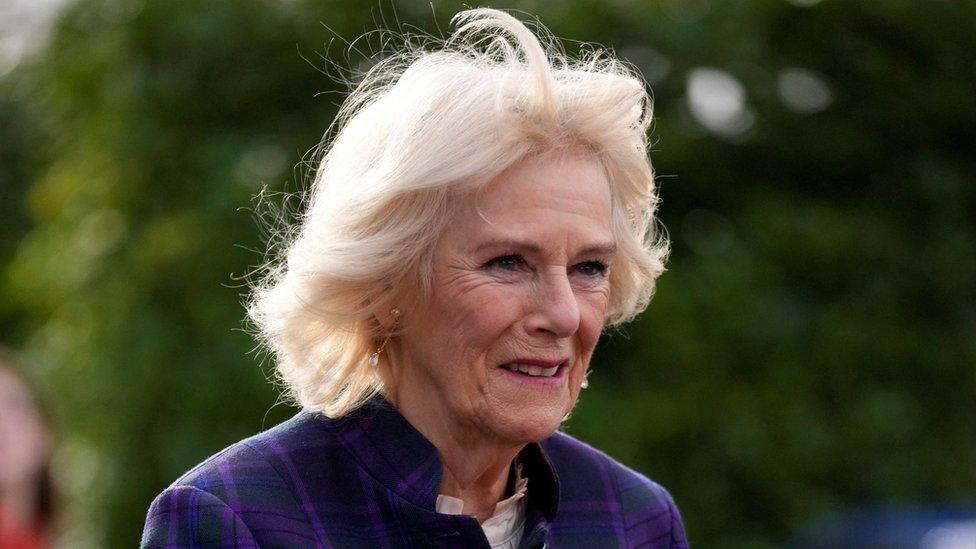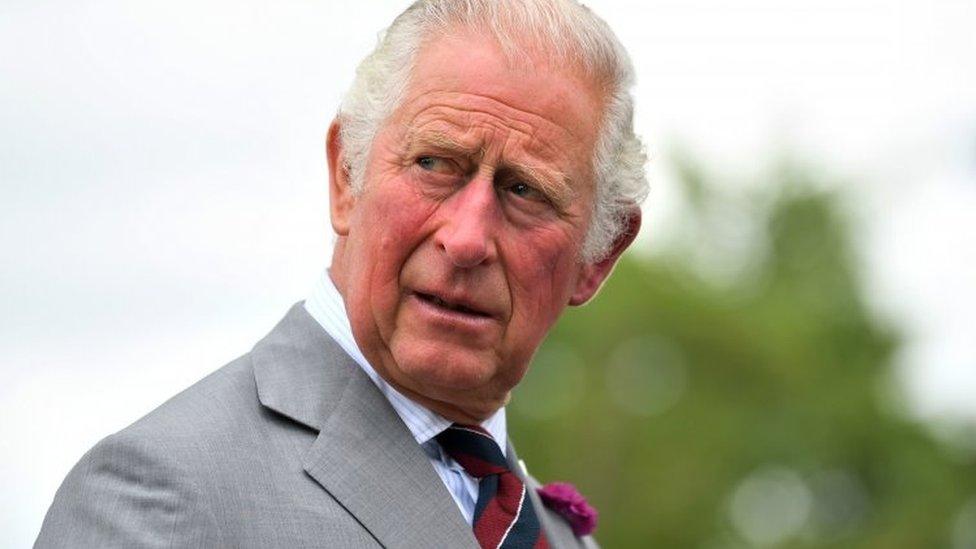The Queen tests positive for Covid
- Published

The Queen has tested positive for Covid, Buckingham Palace has said.
The monarch is experiencing "mild cold-like symptoms" but expects to continue "light duties" at Windsor over the coming week, the palace said.
"She will continue to receive medical attention and will follow all the appropriate guidelines," it added in a statement.
Her eldest son and heir, the Prince of Wales, tested positive on 10 February, after meeting his mother on 8 February.
It is understood a number of people have tested positive at Windsor Castle, where the Queen resides.
Later on Sunday, the Palace issued a congratulatory message from the Queen to the Team GB Curling teams.
She heralded the teams' "outstanding performance" at the Winter Olympics, which led to the women securing a gold medal and the men silver.
She added: "I know that your local communities and people throughout the United Kingdom will join me in sending our good wishes to you, your coaches and the friends and family who have supported you in your great success."
Prime Minister Boris Johnson said he was "sure I speak for everyone in wishing Her Majesty The Queen a swift recovery from Covid and a rapid return to vibrant good health".
Leader of the Opposition, Labour's Sir Keir Starmer, also wished the monarch "good health and a speedy recovery", adding: "Get well soon, Ma'am."
The positive test comes days before England is expected to drop the legal requirement to self-isolate for those who catch Covid, as the last virus restrictions are set to be removed.
Outlining the thinking behind the government's upcoming "living with Covid" plans, Mr Johnson told the BBC it was time to "shift the balance away from state mandation" and said the public can "get their confidence back".
On the eve of her Platinum Jubilee marking 70 years on the throne on 6 February, the Queen carried out her first major public engagement for more than three months, meeting charity workers at Sandringham House.
The Queen, who will be 96 in April, had her first vaccine in January 2021 and is believed to have had all her follow-up jabs after that.
BBC royal correspondent Nicholas Witchell said she had been taking life "rather more easily" since spending a night in hospital for medical checks in October last year.
In November, the Queen missed the Remembrance Sunday service with a strained back, weeks after being advised to rest by doctors following the hospital stay.
It was the first time she missed the ceremony at the Cenotaph in London as monarch, other than when she was pregnant or abroad.
While on light duties it is likely the Queen will be reading documents from UK government ministers and Commonwealth representatives sent to her every day, approving and signing them where necessary.
Antiviral hope
Meanwhile, BBC health correspondent Jim Reed said newly-approved antiviral drugs could aid the Queen's recovery.
He said the drugs were now a key way to cut the risk of vulnerable people needing hospital treatment, although it was not clear if they would definitely be offered to the monarch.
Currently, the available antivirals need to be taken within three to five days of contracting Covid.
The drugs approved for use in the UK include Paxlovid and molnupiravir, which have both demonstrated in medical trials they significantly reduce the risk of hospital admission or death.
On Tuesday, the Queen attended her first official engagement since coming into contact with Prince Charles, holding a virtual meeting with two new ambassadors to the UK.
The following day, she smiled as she suggested she had mobility problems during a meeting with defence staff. Standing while using a walking stick, she pointed to her left leg and said: "Well, as you can see, I can't move."

Palace plays down sense of alarm

The tone of this message from Buckingham Palace seems designed to convey important information about the Queen's health, but at the same time play down any sense of alarm.
So the concern about the 95-year-old monarch catching Covid is set against her being well enough to continue working.
As if to emphasise business-as-usual, the Queen was back at her desk this morning to sign off a congratulations message to the Winter Olympic curling teams.
In terms of what happens next - she is clearly going to be very carefully monitored by her personal medical team.
The Queen's physician, Sir Huw Thomas, has previously described his "key priority" as keeping the Royal Household safe through the pandemic.
We know the Queen had a first vaccination last year and suggestions she has had all three vaccinations have never been denied.
But the Queen's health is usually kept as a firmly private matter, with only the barest of details being revealed.
When Prince Charles and Camilla had Covid last week, there wasn't even any confirmation whether the Queen had been tested.
So it is a significant step to announce she has Covid - which in turn will create pressure for updates.
Read more from Sean here.

Prince Charles, 73, tested positive on 10 February while, his wife, the Duchess of Cornwall, 74, tested positive for the virus last week.
It was the first time the duchess had caught Covid, and the second time for Prince Charles.
The Royal Household has its own physicians, and the Queen's is Sir Huw Thomas, a consultant at St Mary's Hospital in London and professor of gastrointestinal genetics at Imperial College London.
He is "head of the medical household", which is part of the Royal Household looking after the health of the family.

Timeline: The Royal Family and Covid

March 2020: Prince Charles tests positive
April: Duke of Cambridge tests positive
January 2021: The Queen and Prince Philip have their first jabs
February: Prince Charles and Camilla receive their first doses
8 February 2022: Queen spends time with Prince Charles at an event at Windsor Castle
10 February: Prince Charles tests positive a second time
14 February: Camilla tests positive
20 February: Buckingham Palace announces Queen has tested positive

GRAVITY DEFYING TRICKS: James Woods introduces possibly the greatest skier you've never heard of
BOOST YOUR BRAIN: Find out how to banish brain fog with these free and simple steps

Related topics
- Published20 February 2022

- Published14 February 2022

- Published10 February 2022
